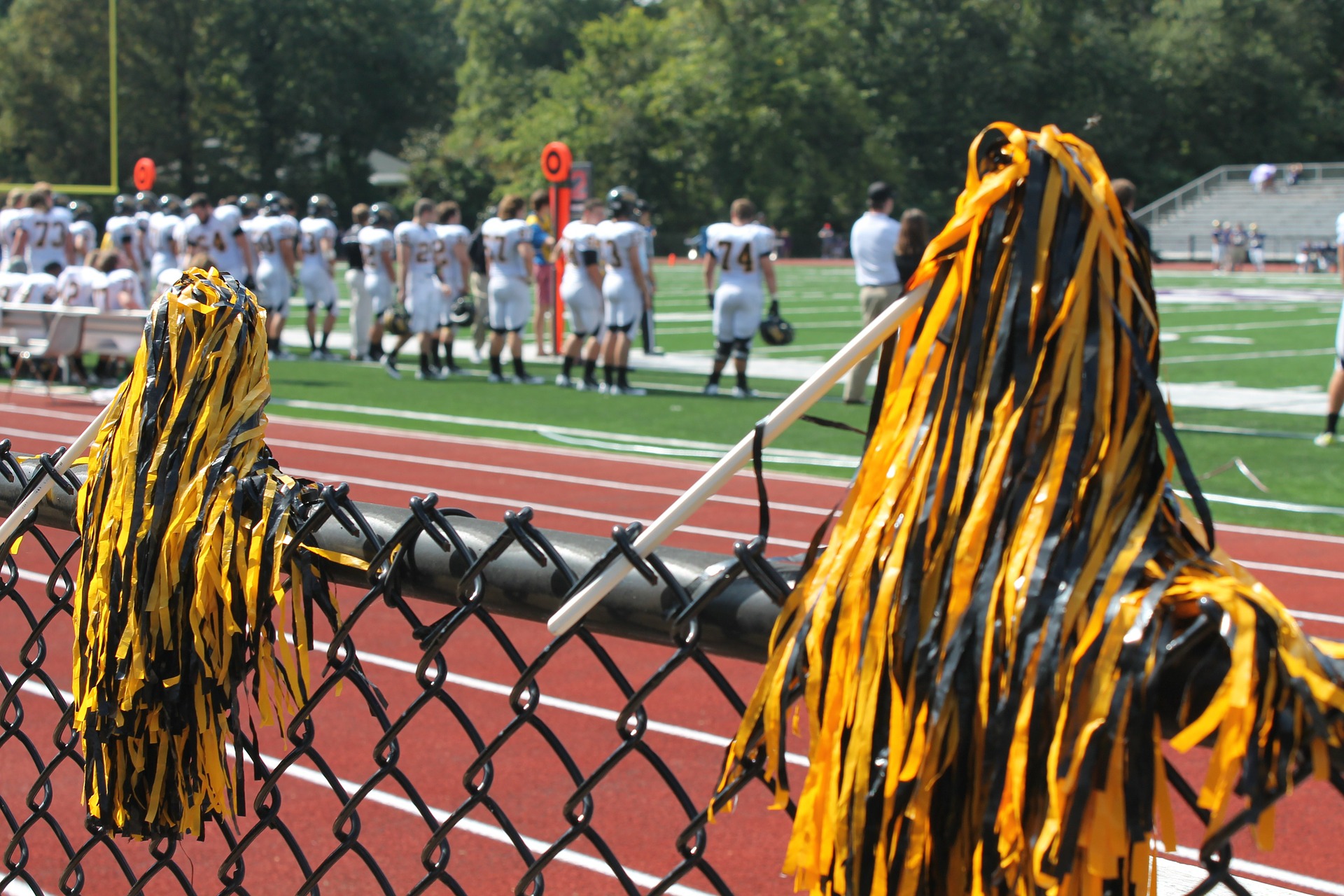Us and Them

In general, being part of a group is a good thing. But sometimes groups can go bad. And moral disaster can sneak up on us if we’re not careful. Let me explain.
Do you remember Friday night football games when you were in high school? I generally directed traffic in the parking lot near the football field during home games. One of the perks was at half-time I got into the games free. I wasn’t an athlete, nor a huge fan, but there was something exhilarating about rooting for our team. And when we won, especially against an important rival, I somehow felt a sense of exuberance. Some called it “school pride.” I was part of something bigger than myself.
I know I had nothing to do with the win. I didn’t even really know most of the football players. But it was my high school. It was part of my identity.
Every time I happen to hear the Beach Boys song, “Be True to Your School,” I think back fondly on those days. (Yes, I have it on my playlist, and yes, I’m old.)
We Are Groupish
We humans like being part of groups. Whether it’s our school, extended family, the company we work for, our church, or a recreational club, we gain satisfaction by the connection. How many of us irrationally open the alumni magazine from our alma mater just to feel good about the university we attended and the alumni association of which we are a part?
As go our groups, so go we. When someone in our group does well, we feel good. When someone in the group hurts, we hurt. When the group is challenged or criticized, we get defensive.
I believe our propensity to like being in community results from being created in God’s image (Genesis 1:26-27). The Christian concept of the Trinity describes a uniquely unified group of three, who are at the same time one. God, Himself, cannot be described without referencing community.
Because of our affinity for groups, we humans tend to be joiners. It happens naturally. Sometimes we don’t have a choice (as in family or country of origin). Sometimes we give it little thought (as in when we are invited to join a weekly card game). And the more we commit to a group, the more frequently we associate or choose one group over others, the more our own identity becomes wrapped up with that group. As our identity merges with the group, we begin to be less detached. We begin to experience as personal the various things the group experiences.
Now all this groupishness is fairly harmless. Belonging brings joy and meaning to our lives. But like most all God’s good gifts it can be turned toward evil. Indeed, there are some significant secret passageways Satan uses to subvert the best of groups. Several phenomena that are part of group nature can be exploited for ill.
Specialization
First, one of the great things about groups is specialization. All of us have some things we do well and like to do, while not doing other things well. A group allows for that kind of diversity. Not everyone has to do everything. Individual members can contribute their unique talent.
But specialization tends to blur responsibility. If something inappropriate or wrong is done, it is pretty easy for almost everyone to evade taking the blame. After all, they were just doing their small function. They didn’t make the decision.
Specialization also can allow us to say, “not my job,” when something needs attention. If it doesn’t fit neatly into how we understand our role, or if it is in some way everyone’s responsibility, the “buck” is easy to pass.
Group Culture
Groups tend toward homogeneity. The people in groups tend to look alike, sound alike and think alike. This is natural. Certain types of people with certain backgrounds tend to join, say, a chess club. They might be somewhat different from those who ride with a motorcycle club or who attend monthly meetings of the quilt guild.
Plus, most groups form within friendship and acquaintance circles. Since we tend to hang out with people who look like us, talk like us, and think like us, those we invite to join groups with us tend to be pretty similar.
Once we are part of a group, we then unconsciously begin to conform to the norms of that particular culture. Usually there is no intentionality to this transformation. It just naturally happens. Like someone moving from Boston to Eastern Kentucky may begin to pick up some of the local accent. In other cases, though, there is great intentionality to cultural adaptation. The military, for example, goes to great lengths to create a unique culture in order to foster esprit de corps.
But culture is a sticky thing. As we become part of a culture, it becomes very difficult to objectively evaluate it. Like a fish unaware of water, we become unaware of the values, assumptions, and worldviews embedded in the cultures of our groups. And when the culture becomes twisted in some way, we have a very tough time seeing it.
Leader/Follower Roles
Generally, when a group forms either formally or informally, a few individuals step forward to assume leadership roles. Most people don’t really want to be leaders. The position often involves more work. In addition, the leader becomes a target of criticism. But there always seem to be some people who long to lead.
This split between those who lead and those who follow is natural. In a healthy group, leadership is often fluid as gifts are used in shifting circumstances. But there are some things about leadership that can easily become toxic.
First, while leading is good, the desire to have power over others can be a real problem. Lord Acton’s famous observation should be sufficient to give us pause.
“Power tends to corrupt, and absolute power corrupts absolutely. Great men are almost always bad men…”
https://en.wikipedia.org/wiki/John_Dalberg-Acton,_1st_Baron_Acton
Second, Scott Peck points out in his book, People of the Lie, the role of a follower is the role of a child. In exchange for not having to take on the responsibility of leading, followers regress and to a degree allow someone else to think for them, make decisions, and take responsibility. Peck calls it being “in thrall.”
While most of the time, and in most groups, these two phenomena cause little concern, there are settings in which things can go badly wrong. History is littered with them.
Group Narcissism
One other issue related to group membership needs attention. Peck refers to it as group “narcissism.” As individuals, we all have varying amounts of narcissism. We all tend to prioritize our own ideas, feelings, needs, and desires. If we’re well adjusted, we have a positive view of ourselves. In general, we believe our actions are good and our ideas are correct. Groups have similar tendencies.
Healthy individuals and groups, however, generally are able to step outside themselves and critically evaluate. They are willing to admit problems or errors. It may be painful, but they can face imperfections.
But just as narcissism in people can become extreme and malignant, it can in groups as well. Malignant narcissism causes people to be wholly unable to face their own imperfections. To preserve their own sense of self-perfection, they destroy anyone who calls that perfection into question.
Groups may lean this direction too. The stronger the group cohesion, the greater the tendency toward malignant group narcissism. What tends to tip groups over is the definition of those outside the group as “the enemy.”
All groups have insiders and outsiders. That’s the definition of a group. But something unique happens in groups as they define themselves. Groups tend to justify or excuse any mistakes or failings of insiders as anomalies. Problems are caused by circumstances or are simple mistakes. They may also trace them to the act of a single individual–perhaps a “bad apple.” They don’t see them as reflecting badly on the group as a whole.
When it comes to outsiders, however, the tables are turned. Those inside the group view problematic actions of an individual outsider as representative of the group as a whole. They believe a flaw in a member of a rival group is not due to circumstances or to one bad actor, but to something seriously wrong with the entire group. Social psychologists call these “biases in attribution.”
When leaders want to energize group cohesion, the most successful technique is to define an enemy. That enemy is then vilified. Any flaw in any member of that enemy group defines the character of the entire group. Those in the “in group” are defined as the good guys. Those in the “enemy group” become the bad guys. Malignant narcissism takes hold.
It’s rare that most voluntary associations such as woodworking clubs or service groups devolve into such narcissism. There is no need for defining an enemy. Sporting groups occasionally dabble in these sorts of misadventures but in general a good coach paired with the customs of sportsmanship and supported by game rules buffer the worst impulses.
But not so with nationalism, political parties, and the military. In these settings, enemies are clearly defined, good guys can do no wrong, and the bad guys are always up to no good. These areas are rife with malignant narcissism.
Is the Church Vulnerable?
But what about the Church? It too is a group. Can it be corrupted through the avenues mentioned above? No question. Apart from unwavering attention to “abiding in the vine,” it too is prone to the same pitfalls. Members can avoid responsibility for the group. The culture can become closed and uniform, excluding those who are different. The Church can fail to see its own problems and flaws. It can rely too much on human leaders and blindly follow where it should not go. It’s leaders can move from being servants in the best sense to those who love the adoration of the crowd and the power it brings.
And the Church, too, can decay into malignant narcissism. This happens all too frequently for many reasons. The following are just a few.
- It may define its enemy as other people who by definition are created and loved by God. Yet Paul reminds the Ephesians that our enemies are not “flesh and blood.”
- It may yoke itself to another secular group in such a way that it is unable to critically evaluate the actions of that other group. This can easily happen with a political party, a particular nation, or a particular race.
- It may allow itself to be led in unthinking servitude by someone wholly unworthy to lead. We have recently seen just how dangerous a powerful yet flawed figure such as Donald Trump can be in this regard.
- It may seek to advance the group itself, abandoning its mission to glorify Christ. There is nothing more dangerous than making the Church and its preservation the primary goal rather than leaning into the Kingdom and its King.
We’ve seen all the dangers listed above realized in the past months within the White Evangelical church in America. Simply by exploiting these vulnerabilities, Satan has won a resounding victory over this important wing of the global Church. The Christian flag being paraded in the House Chamber of the US Capitol on January 6, 2021 merely culminated years of decent into degradation.
Our witness to the world has been silenced. We have lost credibility. As we survey the wreckage we need to weep, repent, and then do the hard work of rebuilding calling on the Holy Spirit, in His grace, to be our architect and builder. May God have mercy.

